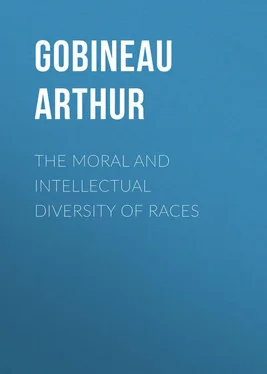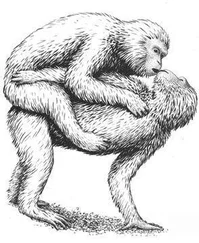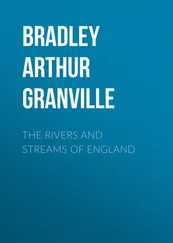Arthur Gobineau - The Moral and Intellectual Diversity of Races
Здесь есть возможность читать онлайн «Arthur Gobineau - The Moral and Intellectual Diversity of Races» — ознакомительный отрывок электронной книги совершенно бесплатно, а после прочтения отрывка купить полную версию. В некоторых случаях можно слушать аудио, скачать через торрент в формате fb2 и присутствует краткое содержание. Жанр: История, foreign_antique, foreign_prose, на английском языке. Описание произведения, (предисловие) а так же отзывы посетителей доступны на портале библиотеки ЛибКат.
- Название:The Moral and Intellectual Diversity of Races
- Автор:
- Жанр:
- Год:неизвестен
- ISBN:нет данных
- Рейтинг книги:4 / 5. Голосов: 1
-
Избранное:Добавить в избранное
- Отзывы:
-
Ваша оценка:
- 80
- 1
- 2
- 3
- 4
- 5
The Moral and Intellectual Diversity of Races: краткое содержание, описание и аннотация
Предлагаем к чтению аннотацию, описание, краткое содержание или предисловие (зависит от того, что написал сам автор книги «The Moral and Intellectual Diversity of Races»). Если вы не нашли необходимую информацию о книге — напишите в комментариях, мы постараемся отыскать её.
The Moral and Intellectual Diversity of Races — читать онлайн ознакомительный отрывок
Ниже представлен текст книги, разбитый по страницам. Система сохранения места последней прочитанной страницы, позволяет с удобством читать онлайн бесплатно книгу «The Moral and Intellectual Diversity of Races», без необходимости каждый раз заново искать на чём Вы остановились. Поставьте закладку, и сможете в любой момент перейти на страницу, на которой закончили чтение.
Интервал:
Закладка:
A theory to be correct, must admit of mathematical demonstration. The most civilized nations, then, would be the most effeminate; the most barbarous, the most warlike. And, descending from nations to individuals, the most cultivated and refined mind would be accompanied by a deficiency in many of the manly virtues. Such an assertion is ridiculous. The most refined and fastidious gentleman has never, as a class, displayed less courage and fortitude than the rowdy and fighter by profession. Men sprung from the bosom of the most polished circles in the most civilized communities, have surpassed the most warlike barbarians in deeds of hardihood and heroic valor.
Civilization, therefore, produces no degeneracy; the cultivation of the arts of peace, no diminution of manly virtues. We have seen the peaceful burghers of free cities successfully resist the trained bands of a superior foe; we have seen the artisans and merchants of Holland invincible to the veteran armies of the then most powerful prince of Christendom, backed as he was by the inexhaustible treasures of a newly discovered hemisphere; we have seen, in our times, troops composed of volunteers who left their hearthstones to fight for their country, rout incredible odds of the standing armies of a foe, who, for the last thirty years, has known no peace.
I believe that an advanced state of civilization, accompanied by long peace, gives rise to a certain domestication of man, that is to say, it lays on a polish over the more ferocious or pugnacious tendencies of his nature; because it, in some measure deprives him of the opportunities of exercising them, but it cannot deprive him of the power, should the opportunity present itself. Let us suppose two brothers born in some of our great commercial cities, one to enter a counting-house, the other to settle in the western wilderness. The former might become a polished, elegant, perhaps even dandified young gentleman; the other might evince a supreme contempt for all the amenities of life, be ever ready to draw his bowie-knife or revolver, however slight the provocation. The country requires the services of both; a great principle is at stake, and in some battle of Matamoras or Buena Vista, the two brothers fight side by side; who will be the braver?
I believe that both individual and national character admit of a certain degree of pressure by surrounding circumstances; the pressure removed, the character at once regains its original form. See with what kindliness the civilized descendant of the wild Teuton hunter takes to the hunter's life in new countries, and how soon he learns to despise the comforts of civilized life and fix his abode in the solitary wilderness. The Normans had been settled over six centuries in the beautiful province of France, to which they gave their name; their nobles had frequented the most polished court in Europe, adapted themselves to the fashions and requirements of life in a luxurious metropolis; they themselves had learned to plough the soil instead of the wave; yet in another hemisphere they at once regained their ancient habits, and – as six hundred years before – became the most dreaded pirates of the seas they infested; the savage buccaneers of the Spanish main. I can see no difference between Lolonnois and his followers, and the terrible men of the north (his lineal ancestors) that ravaged the shores of the Seine and the Rhine, and whose name is even yet mentioned with horror every evening, in the other hemisphere, by thousands of praying children: "God preserve us from the Northmen." Morgan, the Welch buccaneer, who, with a thousand men, vanquished five times as many well-equipped Spaniards, took their principal cities, Porto Bello and Panama; who tortured his captives to make them reveal the hiding-place of their treasure; Morgan might have been – sixteen centuries notwithstanding – a tributary chief to Caractacus, or one of those who opposed Cæsar's landing in Britain. To make the resemblance still more complete, the laws and regulations of these lawless bands were a precise copy of those to which their not more savage ancestors bound themselves.
I regret that my limited space precludes me from entering into a more elaborate exposition of the futility of the theory that civilization, or a long continued state of peace, can produce physical degeneracy or inaptitude for the ruder duties of the battle-field; but I believe that what I have said will suffice to suggest to the thoughtful reader numerous confirmations of my position; and I may, therefore, now refer him to Mr. Gobineau's explanation of the term degeneracy. – H.
51
"Nothing but the great number of citizens in a state can occasion the flourishing of the arts and sciences. Accordingly, we see that, in all ages, it was great empires only which enjoyed this advantage. In these great states, the arts, especially that of agriculture, were soon brought to great perfection, and thus that leisure afforded to a considerable number of men, which is so necessary to study and speculation. The Babylonians, Assyrians, and Egyptians, had the advantage of being formed into regular, well-constituted states." — Origin of Laws and Sciences, and their Progress among the most Ancient Nations. By President De Goguet. Edinburgh, 1761, vol. i. pp. 272-273. – H.
52
"Conquests, by uniting many nations under one sovereign, have formed great and powerful empires, out of the ruins of many petty states. In these great empires, men began insensibly to form clearer views of politics, juster and more salutary notions of government. Experience taught them to avoid the errors which had occasioned the ruin of the nations whom they had subdued, and put them upon taking measures to prevent surprises, invasions, and the like misfortunes. With these views they fortified cities, secured such passes as might have admitted an enemy into their country, and kept a certain number of troops constantly on foot. By these precautions, several States rendered themselves formidable to their neighbors, and none durst lightly attack powers which were every way so respectable. The interior parts of such mighty monarchies were no longer exposed to ravages and devastations. War was driven far from the centre, and only infected the frontiers. The inhabitants of the country, and of the cities, began to breathe in safety. The calamities which conquests and revolutions had occasioned, disappeared; but the blessings which had grown out of them, remained. Ingenious and active spirits, encouraged by the repose which they enjoyed, devoted themselves to study. It was in the bosom of great empires the arts were invented, and the sciences had their birth. " — Op. cit. , vol. i. Book 5, p. 326. – H.
53
The history of every great empire proves the correctness of this remark. The conqueror never attempted to change the manners or local institutions of the peoples subdued, but contented himself with an acknowledgment of his supremacy, the payment of tribute, and the rendering of assistance in war. Those who have pursued a contrary course, may be likened to an overflowing river, which, though it leaves temporary marks of its destructive course behind, must, sooner or later, return to its bed, and, in a short time, its invasions are forgotten, and their traces obliterated. – H.
54
The most striking illustration of the correctness of this reasoning, is found in Roman history, the earlier portion of which is – thanks to Niebuhr's genius – just beginning to be understood. The lawless followers of Romulus first coalesced with the Sabines; the two nations united, then compelled the Albans to raze their city to the ground, and settle in Rome. Next came the Latins, to whom, also, a portion of the city was allotted for settlement. These two conquered nations were, of course, not permitted the same civil and political privileges as the conquerors, and, with the exception of a few noble families among them (which probably had been, from the beginning, in the interests of the conquerors), these tribes formed the plebs . The distinction by nations was forgotten, and had become a distinction of classes . Then began the progress which Mr. Gobineau describes. The Plebeians first gained their tribunes , who could protect their interests against the one-sided legislation of the dominant class; then, the right of discussing and deciding certain public questions in the comitia , or public assembly. Next, the law prohibiting intermarriage between the Patricians and Plebeians was repealed; and thus, in course of time, the government changed from an oligarchical to a democratic form. I might go into details, or, I might mention other nations in which the same process is equally manifest, but I think the above well-known facts sufficient to bring the author's idea into a clear light, and illustrate its correctness. The history of the Middle Ages, the establishment of serfdom and its gradual abolition, also furnish an analogue.
Читать дальшеИнтервал:
Закладка:
Похожие книги на «The Moral and Intellectual Diversity of Races»
Представляем Вашему вниманию похожие книги на «The Moral and Intellectual Diversity of Races» списком для выбора. Мы отобрали схожую по названию и смыслу литературу в надежде предоставить читателям больше вариантов отыскать новые, интересные, ещё непрочитанные произведения.
Обсуждение, отзывы о книге «The Moral and Intellectual Diversity of Races» и просто собственные мнения читателей. Оставьте ваши комментарии, напишите, что Вы думаете о произведении, его смысле или главных героях. Укажите что конкретно понравилось, а что нет, и почему Вы так считаете.












